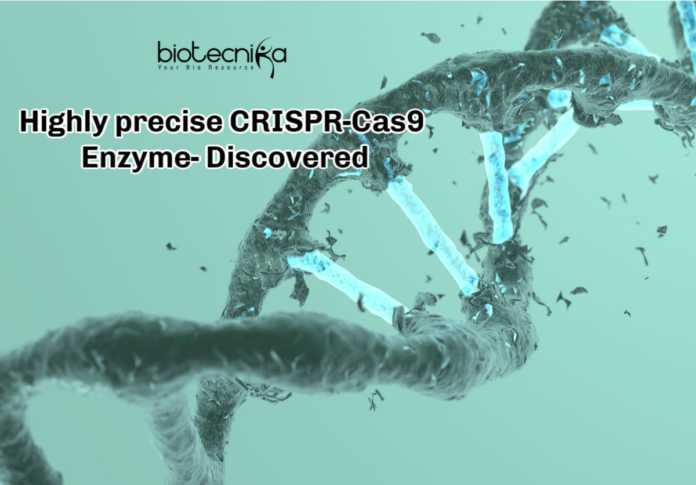Highly precise CRISPR-Cas9 Enzyme
Highly precise CRISPR-Cas9 enzyme is developed by a group of researchers from the City University of Hong Kong (CityU) and Karolinska Institutet that can enhance the targeting accuracy in the genome editing process.
The new CRISPR-Cas9 protein is believed to be very useful in human gene therapies, which require high precision.
CRISPR (Gathered Consistently Interspaced Brief Palindromic Repeats) -Cas9 is a famous gene-editing modern technology that has a broad range of applications, from curing numerous genetic diseases to establishing drought-tolerant plants. Scientists are conducting clinical trials making use of CRISPR-Cas9 to treat cancers, blood problems, and eye diseases.
CRISPR-Cas9 technology gives scientists the ability to change an organism’s DNA. This allows genetic material to be added, removed, or altered at particular locations in the genome. The CRISPR-Cas9 system has generated a great deal of excitement in the clinical research since it is faster, less costly, a lot more accurate, and extra effective than other existing genome editing approaches.
The CRISPR-Cas9 technique was adapted from a naturally occurring genome modifying system in bacteria. The microorganisms capture bits of DNA from the invading viruses and use them to produce DNA segments called CRISPR varieties.
The CRISPR arrays enable
the microorganisms to remember the infections (or carefully relevant ones). If the viruses infect once again, the bacteria create RNA segments from the CRISPR arrays to target the virus genome. The microorganisms then utilize Cas9 or a similar enzyme to cut the DNA apart, which disables the virus.Repairing the genetic defects on-site by Highly precise CRISPR-Cas9 enzyme
CRISPR-Cas9 is regarded as an effective method in gene editing because it has made genetic modifications or editing extremely straightforward. Unlike standard genetics treatment where extra duplicates of a particular gene are introduced into cells, CRISPR-Cas9 repair the genetic issues on-site by getting rid of the malfunctioning genes or correcting it to recover regular gene expressions.
Cas9 enzyme locates the faulty genes throughout the DNA as well as customizes the very same.
However, it has been observed that sometimes it does not have the precision, and modifications of genes at undesirable places in the genome might happen. Unintended alterations of the genomes might potentially bring about serious consequences, such as cancers, as occurred in the preliminary genetics treatment trials years ago.
Therefore it is essential to develop a highly precise CRISPR-Cas9 enzyme to do the molecular modifying on the genome with extreme precision.
Highly precise CRISPR-Cas9 enzyme- More Information
There are two variants of Cas9, particularly SpCas9 (significance Cas9 nuclease from the microorganisms Streptococcus pyogenes) as well as SaCas9 (Cas9 nuclease from Staphylococcus aureus), which are generally used in CRISPR.
Both of them were discovered to have a certain degree of inaccuracy or off-target results.
The customized SpCas9 variants crafted to boost SpCas9’s targeting precision were large to fit in the tiny shipment vector called adeno-associated viral (AAV) vector that is typically utilized for in vivo gene therapy. However, SaCas9 is much smaller than SpCas9, as well as can be quickly packaged in the payload-limited AAV vectors for providing gene-editing elements in vivo. Nevertheless, no SaCas9 variation with high genome-wide targeting accuracy was discovered to date.
Highly precise CRISPR-Cas9 enzyme SaCas9-HF to increase the precision in genome editing
Dr. Zheng Zongli, Assistant Professor of Department of Biomedical Sciences at CityU and the Ming Wai Lau Centre for Reparative Medicine of Karolinska Institutet in Hong Kong, and Dr. Shi Jiahai, Assistant Teacher of Division of Biomedical Sciences at CityU, efficiently crafted SaCas9-HF, a CRISPR Cas9 variant which reveals high precision in genome-wide targeting in human cells without compromising on-target performance.
The research group’s finding was based upon a considerable examination of 24 targeted human genetic locations comparing the initial unmodified (wild-type) SaCas9 and also the new SaCas9-HF.
For those targets having comparable sequences in the genome and thus prone to off-target adjustment by the wild-type enzyme, SaCas9-HF decreased the off-target task by about 90%. For those targets with rather much less off-target modifying by the wild-type enzyme, this highly precise CRISPR-Cas9 enzyme SaCas9-HF yielded no observable off-target activity.
The research findings were published in the scientific journal Process of the National Academy of Sciences (PNAS) labeled “Logically engineered Staphylococcus aureus Cas9 nucleases with high genome-wide uniqueness.”






























